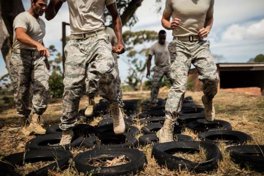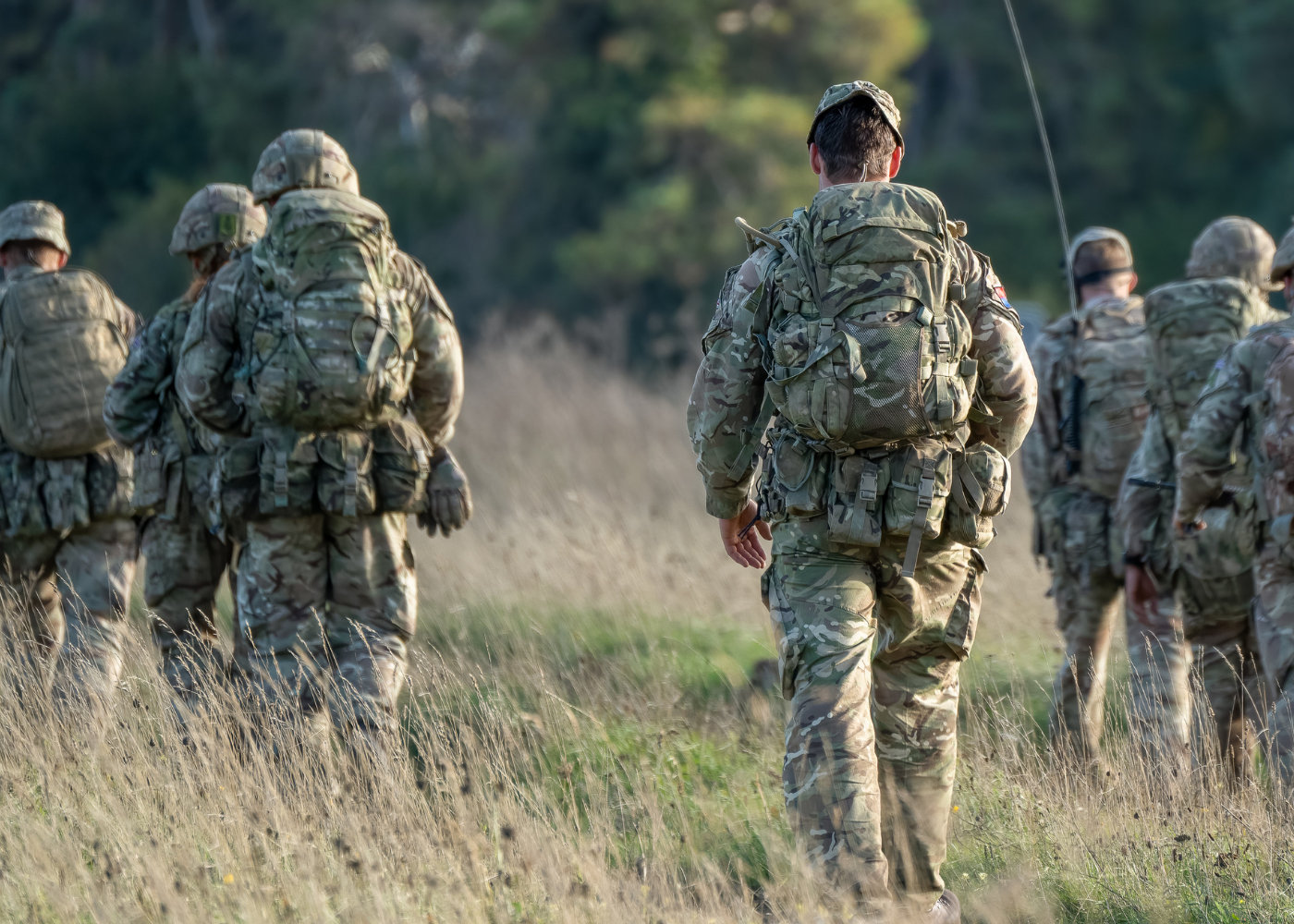What happened
Our client was taking part in a routine training exercise whilst serving in the military. The session involved casualty evacuation (often referred to as ‘cas-evac’) drills, which are designed to prepare soldiers to rescue injured colleagues during combat or emergencies. As part of the exercise, he was instructed to work in pairs and perform a variety of lifting techniques under supervision.
During one of these lifts, known as a ‘baby carry’, a manual technique that places particular strain on the lower back, our client experienced sudden and severe pain. Despite showing clear signs of distress, including visible discomfort and audible expression of pain, he was told by the supervising instructor to continue with the session and not to seek medical attention until the drill had been completed.
Afterwards, he was placed on ‘light duties’, which are intended to reduce physical strain during recovery. Unfortunately, these restrictions were not properly followed or enforced by his chain of command, and he was expected to continue duties that were not appropriate for his condition. This led to his injury worsening over time.
He continued to experience persistent pain and mobility issues in the weeks and months that followed. Despite raising concerns, he faced difficulty having his injury acknowledged, and the situation began to affect both his physical and mental wellbeing.
Legal challenges and how we helped
When our client approached our Military Claims Solicitors, we took the time to understand not only what had happened, but also the wider impact the injury had on his military career and everyday life. He explained that he was simply following instructions during the training exercise, the lift had been directed by his instructor, and he alerted them to the pain as soon as it began. Yet the Ministry of Defence disputed his account entirely.
In fact, the MoD initially denied that the incident had happened at all. They claimed that our client had not been instructed to perform the baby carry and that his injury was not related to any training exercise. They also challenged whether the injury had even taken place in the way he described. This meant that every part of his claim, from the basic facts through to the cause of the injury, was disputed.
To support our client, we began gathering evidence from others who were present. This included contacting colleagues and fellow service members who could confirm that the incident had occurred and that the instructions given during the exercise matched what our client had said. We also had to review and challenge inconsistencies in the medical records, which contained inaccuracies that could have affected his case.
Once formal court proceedings were issued, the Ministry of Defence continued to deny responsibility. They did not formally admit that the incident had happened, nor did they accept that the injury was caused by any negligence during the training exercise. But crucially, they also chose not to put forward any of their own witness evidence to challenge our client’s version of events. This meant that, although the MoD never admitted fault, they were no longer actively trying to prove their position in court. Without any opposing evidence from the defendant, our client’s account stood unchallenged in terms of the facts. At that point, the focus of the case shifted from what had happened during the exercise to how serious the injury was and the appropriate level of compensation to reflect the impact it had on his life.
Back injuries can be especially complex to assess. There is often no single test or scan that shows the full picture, and different medical experts can give varying opinions on how the injury developed and whether it was caused by a specific incident. After thorough discussions between medical professionals and careful consideration by both legal teams it was agreed that the most constructive way forward would be to resolve the case through a negotiated settlement.

The outcome
After months of preparation and discussions between both legal teams, our client’s case was settled for £30,000. This figure was agreed after looking carefully at how the injury had affected his day-to-day life, including the pain he experienced, the disruption to his military training and duties, and the longer-term impact of living with a back injury that still affects what he can do.
The compensation also recognised the practical support he needed during his recovery, and how the injury had knocked his confidence when it came to carrying out physical tasks he used to manage with ease. It reflected not just the obvious effects, but the ongoing strain that a persistent back condition can cause physically, mentally and emotionally.
Although the Ministry of Defence never admitted legal responsibility for the incident, the case was resolved after formal court proceedings had begun, which meant our client was spared the pressure of going through a full trial. In claims like this, where the facts are strongly disputed and medical opinions do not always align, reaching a fair settlement out of court can be the best way to bring closure and allow someone to move forward with their life.
Life after the injury
Although the injury will always affect him to some extent, our client has worked hard to overcome it and build a full and meaningful life. He’s married now, has a young child, and continues to serve in the Armed Forces.
The compensation helped to recognise what he went through, eased some of the pressure by covering the cost of treatment and recovery, and gave him the reassurance that the seriousness of his injury was acknowledged. He still lives with ongoing discomfort, but he’s adapted well. He’s found ways to manage the pain and continue with his duties, and he’s looking ahead to the future with real purpose.

Simpson Millar’s support
We know how overwhelming it can be to start a legal claim, especially when the other side is refusing to acknowledge what happened. That is why we made it a priority from day one to make sure our client felt supported and clearly informed every step of the way.
This case lasted several years, and over that time, we built a strong and trusting relationship with our client. We always took the time to explain what was happening, what to expect next, and why each step was important, so he always had a clear picture of how his case was progressing. He knew he could call us whenever he had questions, and we would always be there to talk things through.
Because the case was both long-running and complex, it was important that our client never felt like just a case number. We worked hard behind the scenes to gather the evidence we needed, but we also made sure he felt involved and understood the decisions being made along the way.
He later told us how much it meant to him that we were approachable and clear, and that we made time for him no matter how busy things were. He felt genuinely looked after throughout, and has since recommended Simpson Millar to others, which is something we are proud of because it shows he truly valued the service and support we gave.
How we can help others
If you have been injured during military service or whilst taking part in a training exercise, and feel that it could have been avoided, we may be able to help you claim compensation. There are also times where you can become injured during military service without fault and we can help with that too.
At Simpson Millar, we know how dedicated service personnel are to their roles, and how difficult it can be to speak up when something goes wrong, especially in an environment that relies on following orders, trusting your chain of command, and pushing through discomfort. But no one should have to live with long-term pain, restricted movement, or career setbacks because safety procedures were not followed or proper care was not taken.
We have experience supporting Armed Forces personnel in cases where training exercises caused avoidable injury, and we understand just how much an injury can affect both your professional future and personal life. Whether you are still serving or have since left the Forces, it may be possible to claim compensation to help with your recovery, support your family, and make up for time lost due to the injury.
Compensation could help cover the cost of treatment, rehabilitation, time off work, and any care or support you have needed from others. It can also reflect the impact on your ability to serve, your confidence in training, and the wider emotional toll of having your career disrupted. Most importantly, it can give you recognition and peace of mind that what happened has been taken seriously.
If you are unsure where to start, we offer a free initial consultation where we will listen to your experience and explain clearly if we think you have grounds to bring a claim. You are under no obligation to move forward unless you choose to, and everything you share with us is completely confidential.
Call our Military Claims team today on 0808 239 5461 or request a callback and we will be in touch at a time that works for you. We are here to make the legal process feel clear, supportive, and focused on you.



